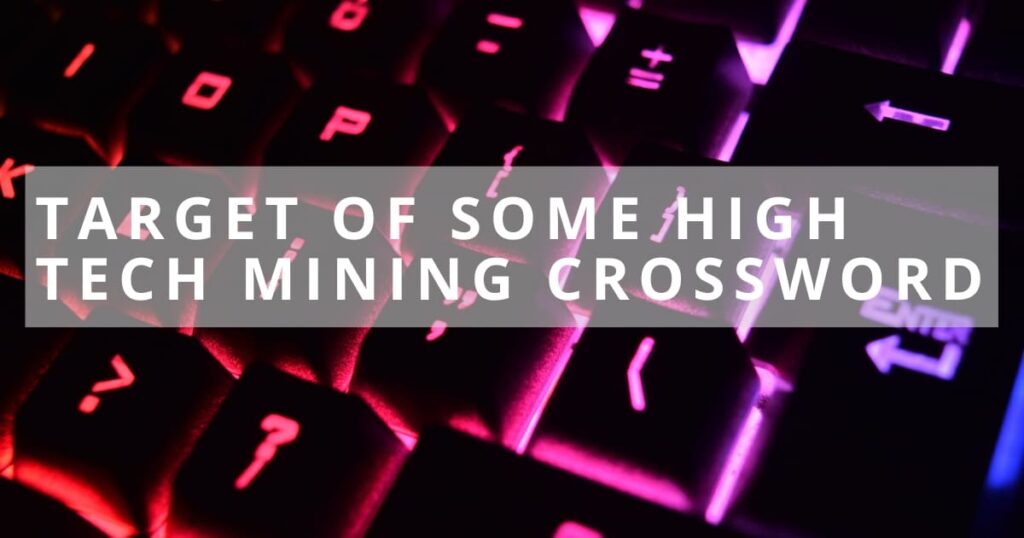The mining industry has undergone revolutionary change during the last few decades due to technical and engineering betterments, which have been innovation’s driving forces. From the early days of manually operated tools and crude extraction techniques to the present day, when state-of-the-art mining dominates the sector, there has been a lot of advancement in the mining industry.
This evolution is far beyond the conventional notion of getting things done more smartly; it imagines a holistic paradigm shift in the way resources are found, mined, and refined. Modern mining utilizes mechanization and robotization, along with a quantitative approach to managing resources and satellite technology, to access ore that was not considered minable or was too expensive to mine previously.
In this introductory paragraph we will discuss all about you need to know about Target of Some High Tech Mining Crossword.
The Role of Advanced Technologies in Resource Extraction
Modern mining enterprises are associated with rather complex technologies and machines that are currently redefining the capabilities of the industry. For example, automation and robotics have stayed on the trend. This field improves work conditions and raises the flexibility and efficiency of mining operations.
On the other hand, advancements in technologies such as 3D modelling and IoT devices are useful in that they allow stakeholders to monitor and control mining activities in real time. Part three will represent the use of these technologies in various fields, using the example of cases where innovations made solutions in rock extraction very spectacular to the audience.
It will talk about both the economics and the study of all the aspects of employment of these technologies, which will be its major task.
Key Tools in Mineral Exploration
Geological mapping and geophysical surveys are the basis for mineral exploration, which helps to understand the structure and physical features of the Earth. Scientific methodologies that utilize reliable tools and measurements enable mining companies to pinpoint mineral deposits that are likely profitable.
Advanced tools, including LiDAR, hyperspectral imaging, and satellite remote sensing, have created a set of new instruments that provide detailed pictures of the subsurface composition and structure.
This section will explain these tools in depth, exploring how they contribute to efficient target identification and evaluation. Examples of successful mining projects that leveraged these technologies will illustrate their practical benefits and the precision they bring to the exploration process.
Challenges in Identifying Viable Mining Targets
The most pressing challenge amongst many others in the mining industry is identifying suitable mining mines despite technological advancements. Such complexity revolves around geological (uncertainties) problems, regulatory requirements, and environmental considerations. Inevitably, these are the major stumbling blocks.
The third part, which is going to cover the challenge of these risks more precisely, will indicate both the ways in which technology reduces the risk partially and also the ways it deals with it completely.
It will also lead to an examination of how geologists and engineers utilize high-precision 3D models and predictive simulations to master and work with these complexities. Talking about the specific cases of mining projects that met tremendous challenges and the approaches and strategies used to overcome those problems will be conducted to manifest the active nature of hard work and solutions.
High-Tech Tools for Precise Target Evaluation
When optimizing the different high-tech mining apparatuses, accuracy is the one factor that guarantees success. It will strike a balance between cutting-edge solutions such as high-resolution geological modelling software, LiDAR remote sensing tools, and hyperspectral imaging. These tool collections provide difficult data that enable the decision-making steps.
The narrative will include case studies of these technologies’ pivotal role in identifying and evaluating mining sites, underscoring their impact on reducing costs and improving yield efficiencies. The discussion will extend to the integration of these technologies into existing mining operations, showcasing how they complement traditional exploration methods.

Target of Some High Tech Mining Crossword
This gives us twofold benefits: on the one hand, mining accepts a wide range of prices, from gold to rhenium; on the other hand, it requires special attention to each mining target. To start with, this section will classify and explain different mining targets and the specialized technologies and methods deployed to extract each kind.
In this section, the various physical and chemical properties of minerals will be stressed, which in turn will impact select mining techniques and equipment. The story will additionally underline the importance of minerals for economies and strategies, especially based on the example of Lithium and Cobalt used to manufacture batteries and Smartphones.
The use of real-world cases of mines that host such online stores for one-, two-, and three-month trips will have practical implications.
The Significance of Epithermal Vein Systems in Precious Metal Mining
Gold and silver are useful metals that are common in vein systems of epithermal deposits, which makes them important for the process of their extraction. The geological process of epithermal veins will be explained in this part. They will be discussed in detail so as to determine why they are rich in high-grade ore.
The last part of the section will highlight the special difficulties and mining technologies of those places, such as deep underground drilling and thermal imaging for ore localization purposes. The cases from several mining operations that target epithermal veins will be used to describe both the complexities and achievements of mining geological structures of epithermal type.
The Science Behind Placer Deposits
Placering, one of the oldest methods of mining, is based on the recovery of gold, platinum, and other commercial minerals through hydraulically flowing sediment discharge. This part will discuss the background of how these elements are loaded in placer pools by the geological process.
It will also demonstrate innovations in placer mining, excluding traditional panning and submersion, such as dredging and sluicing, that improve the efficiency and environmental sustainability of such activities. The presentation session will feature historical and modern mining gold rushes that are instrumental in defining value.
Thus, the interface shall be between historical practices and contemporary developments.
Mining for Industrial Progress
First in line are the base metals like copper, zinc, and nickel, furthered by rare earth elements (REEs). Base metals are indispensable for the industrial sector, whereas REEs are basic for technological advancement. Furthermore, this session will focus on the specific mining techniques and technologies that are employed by various players in this field to extract these value-adding resources.
It will emphasize the role of these particular metals as nightmare supply chain aspects and their usage in everything from electronic devices to renewable energy systems.
The attention will also be on the challenges faced in the mining of REEs, which are mostly often found in difficult locations, and activities of mining are made successful with the use of more advanced extraction and processing techniques.
The case of world-class mining operations will be used as a showcase of how competence and technology have transformed and enabled the processing of ores even in the harshest of locations.
Innovative Techniques in High-Tech Mining Operations
Innovation is a key factor defining high-tech mines. In this part of the article, I will cover some of the most equipment advancements in the silviculture industry. Innovative methods like in-situ leaching, which is cheaper and faster to mine minerals without the use of conventional mining technology, and biotechnology in bioleaching that effectively minimizes environmental impact are employed.
The discussion will then go to discussing VR and AR, which will allow the workers to run trial operations on computer simulation and in a virtual environment before implementation. Marking out particular cases, this section displays how the original method of approach is used in actual case studies and addresses newer methods of mining.
Leveraging Data Analytics and Machine Learning in Mining
Data analytics and machine learning (ML) are today’s renaissance in how operations are done in mining enterprises. This part of the discussion will focus on big data analytics and MLML models used to study geological data, boost mining operations, and introduce safety measures.
The main applications to be dealt with will be predictive maintenance, a method used to forecast equipment failures through data, and resource modelling that provides data to programs estimating mineral reserves more accurately.
Including real-life examples will make sure that the discussion will visualize the positive impact data-driven techniques make on mining companies and management processes.
Sustainable Practices in Modern Mining
This is because sustainability is an important criterion for modern mining practices. This part is devoted to considering green measures being implemented by the industry, including water recycling, reforestation, renewable energy, and so on. It will touch upon the regulating pressures and community expectations in a bid to spur such trends, as well as consider the economic gains of inducing green technologies in the company.
The case studies from mining operations that have implemented sustainable practices and recorded the success of this application are given to demonstrate that the same can be done in real offices.

Integration of Renewable Energy Solutions
The inclusion of green energy in mines’ operations is becoming more important as it becomes a viable tool to cut down CO2 emissions in the mining industry and pay for less expensive energy resources. Therefore, this section will be devoted to the emergence of sun, wind and geothermal energy as central sources of energy in mining operations in various parts of the world.
This category will explore the two sides of the coin – on the one hand, they are clean and affordable, while on the other hand, they might be expensive in the present. Through the example of mining enterprises which introduced renewable energy techniques, I will show the concrete benefits and the obstacles on their way to success in using solar panels and wind turbines.
It will also shed light on new prospects for energy use in the industry, including hydrogen as an energy source and powerful battery operation storage systems for mining.
Conclusion
This ending will rejoin the themes that have been talked about throughout the article. Finally, it will express the fact that high-tech mining, however, looks like a merging of innovation and effectiveness.
It will outline the main trends that take place in the form of innovative technologies providing safer working conditions, more efficient resource extraction methods and sustainable activities that are in line with the global requirements for environment preservation.
Besides, this part will look forward to the mining industry operations due to technological development and future horizons based on ethical and environmental aspects.
The last paragraph will reiterate that the switching on of technology implicates the turn round of methods through which the Earth’s mineral resources will be extracted and processed, thus making the industry remain important in the global economy but more environmentally friendly and less invasive.
FAQ’s About Target of Some High Tech Mining Crossword
What are high-tech mining targets?
High-tech mining targets refer to specific areas or geological formations that hold the potential for significant resource extraction, such as precious metals, base metals, rare earth elements, and energy minerals. These targets are identified using advanced geological mapping, remote sensing, and data analysis techniques.
How are high-tech tools used in target identification?
High-tech tools, including remote sensing technologies like LiDAR and hyperspectral imaging, are used to analyze terrain, geological structures, and mineralogy. These tools provide essential data and insights that help geologists identify prospective mining targets with greater accuracy.
What challenges are associated with mining target identification?
The identification of mining targets faces several challenges, including geological uncertainty, regulatory constraints, and environmental considerations. Additionally, as miners deplete accessible deposits, they must venture into more remote or technically challenging areas, increasing the complexity of the process.
How does sustainability factor into high-tech mining practices?
Sustainability is increasingly important in mining, leading to the adoption of innovative practices such as in-situ leaching, bioleaching, and mine reclamation technologies. Incorporating renewable energy sources and executing water management strategies also contribute to more environmentally responsible mining operations.
What role does remote sensing play in high-tech mining?
Remote sensing plays a crucial role in high-tech mining by providing detailed and accurate data about the Earth’s surface and subsurface. Technologies like LiDAR and hyperspectral imaging help map out and analyze mineral-rich areas, enabling more targeted and efficient mining practices.
How do automation and robotics enhance mining safety?
Automation and robotics enhance mining safety by reducing the need for human presence in unsafe mining environments. Autonomous vehicles and robotic systems can perform hazardous tasks, particularly reducing the risk of accidents and improving overall safety for mining personnel.
What are some examples of renewable power sources used in mining?
Solar panels, breeze turbines, and geothermal energy are examples of renewable energy sources increasingly used in mining operations. These sources help reduce the carbon footprint of mining activities and can lead to cost savings over time due to lower energy costs.
How is artificial intelligence used to predict equipment maintenance?
Artificial intelligence (AI) is used in mining to analyze data from equipment sensors and operational logs to predict potential failures and maintenance needs. AI algorithms can identify patterns that precede gear issues, allowing for preemptive maintenance and reducing downtime.



